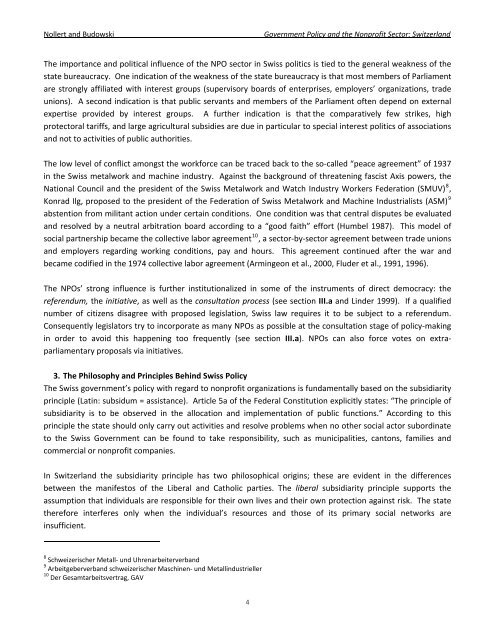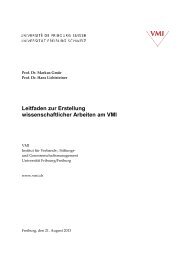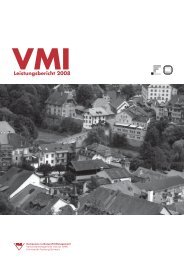Government Policy and the Nonprofit Sector: Switzerland - VMI
Government Policy and the Nonprofit Sector: Switzerland - VMI
Government Policy and the Nonprofit Sector: Switzerland - VMI
- TAGS
- nonprofit
- switzerland
- vmi.ch
Create successful ePaper yourself
Turn your PDF publications into a flip-book with our unique Google optimized e-Paper software.
Nollert <strong>and</strong> Budowski <strong>Government</strong> <strong>Policy</strong> <strong>and</strong> <strong>the</strong> <strong>Nonprofit</strong> <strong>Sector</strong>: Switzerl<strong>and</strong><br />
The importance <strong>and</strong> political influence of <strong>the</strong> NPO sector in Swiss politics is tied to <strong>the</strong> general weakness of <strong>the</strong><br />
state bureaucracy. One indication of <strong>the</strong> weakness of <strong>the</strong> state bureaucracy is that most members of Parliament<br />
are strongly affiliated with interest groups (supervisory boards of enterprises, employers’ organizations, trade<br />
unions). A second indication is that public servants <strong>and</strong> members of <strong>the</strong> Parliament often depend on external<br />
expertise provided by interest groups. A fur<strong>the</strong>r indication is that <strong>the</strong> comparatively few strikes, high<br />
protectoral tariffs, <strong>and</strong> large agricultural subsidies are due in particular to special interest politics of associations<br />
<strong>and</strong> not to activities of public authorities.<br />
The low level of conflict amongst <strong>the</strong> workforce can be traced back to <strong>the</strong> so‐called “peace agreement” of 1937<br />
in <strong>the</strong> Swiss metalwork <strong>and</strong> machine industry. Against <strong>the</strong> background of threatening fascist Axis powers, <strong>the</strong><br />
National Council <strong>and</strong> <strong>the</strong> president of <strong>the</strong> Swiss Metalwork <strong>and</strong> Watch Industry Workers Federation (SMUV) 8 ,<br />
Konrad Ilg, proposed to <strong>the</strong> president of <strong>the</strong> Federation of Swiss Metalwork <strong>and</strong> Machine Industrialists (ASM) 9<br />
abstention from militant action under certain conditions. One condition was that central disputes be evaluated<br />
<strong>and</strong> resolved by a neutral arbitration board according to a “good faith” effort (Humbel 1987). This model of<br />
social partnership became <strong>the</strong> collective labor agreement 10 , a sector‐by‐sector agreement between trade unions<br />
<strong>and</strong> employers regarding working conditions, pay <strong>and</strong> hours. This agreement continued after <strong>the</strong> war <strong>and</strong><br />
became codified in <strong>the</strong> 1974 collective labor agreement (Armingeon et al., 2000, Fluder et al., 1991, 1996).<br />
The NPOs’ strong influence is fur<strong>the</strong>r institutionalized in some of <strong>the</strong> instruments of direct democracy: <strong>the</strong><br />
referendum, <strong>the</strong> initiative, as well as <strong>the</strong> consultation process (see section III.a <strong>and</strong> Linder 1999). If a qualified<br />
number of citizens disagree with proposed legislation, Swiss law requires it to be subject to a referendum.<br />
Consequently legislators try to incorporate as many NPOs as possible at <strong>the</strong> consultation stage of policy‐making<br />
in order to avoid this happening too frequently (see section III.a). NPOs can also force votes on extra‐<br />
parliamentary proposals via initiatives.<br />
3. The Philosophy <strong>and</strong> Principles Behind Swiss <strong>Policy</strong><br />
The Swiss government’s policy with regard to nonprofit organizations is fundamentally based on <strong>the</strong> subsidiarity<br />
principle (Latin: subsidum = assistance). Article 5a of <strong>the</strong> Federal Constitution explicitly states: “The principle of<br />
subsidiarity is to be observed in <strong>the</strong> allocation <strong>and</strong> implementation of public functions.” According to this<br />
principle <strong>the</strong> state should only carry out activities <strong>and</strong> resolve problems when no o<strong>the</strong>r social actor subordinate<br />
to <strong>the</strong> Swiss <strong>Government</strong> can be found to take responsibility, such as municipalities, cantons, families <strong>and</strong><br />
commercial or nonprofit companies.<br />
In Switzerl<strong>and</strong> <strong>the</strong> subsidiarity principle has two philosophical origins; <strong>the</strong>se are evident in <strong>the</strong> differences<br />
between <strong>the</strong> manifestos of <strong>the</strong> Liberal <strong>and</strong> Catholic parties. The liberal subsidiarity principle supports <strong>the</strong><br />
assumption that individuals are responsible for <strong>the</strong>ir own lives <strong>and</strong> <strong>the</strong>ir own protection against risk. The state<br />
<strong>the</strong>refore interferes only when <strong>the</strong> individual’s resources <strong>and</strong> those of its primary social networks are<br />
insufficient.<br />
8<br />
Schweizerischer Metall‐ und Uhrenarbeiterverb<strong>and</strong><br />
9<br />
Arbeitgeberverb<strong>and</strong> schweizerischer Maschinen‐ und Metallindustrieller<br />
10<br />
Der Gesamtarbeitsvertrag, GAV<br />
4











